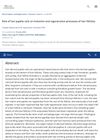Androgen-Inducible TGF-β1 from Balding Dermal Papilla Cells Inhibits Epithelial Cell Growth: A Clue to Understanding Paradoxical Effects of Androgen on Human Hair Growth
October 2002
in “
The FASEB journal
”

TLDR Androgens may cause hair loss by increasing TGF-beta1 from scalp cells, which inhibits hair cell growth.
In a study from 2002, researchers developed an in vitro coculture system using human dermal papilla cells (DPCs) from individuals with androgenetic alopecia (AGA) and keratinocytes (KCs) to investigate the role of androgens in hair growth. Initially, androgens did not affect KC growth when cocultured with AGA DPCs. However, after transiently transfecting DPCs with an androgen receptor (AR) expression vector, androgen treatment resulted in a significant 50% suppression of KC growth. This suppression was linked to an increase in TGF-beta1 mRNA expression and secretion in DPCs induced by androgen. The growth inhibition effect was reversed by a neutralizing anti-TGF-beta1 antibody in a dose-dependent manner. These results indicate that TGF-beta1, stimulated by androgens in DPCs from AGA patients, may play a role in inhibiting epithelial cell growth, shedding light on the complex effects of androgens on human hair growth.









